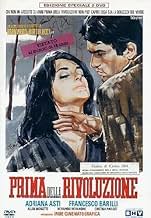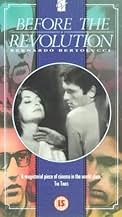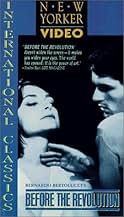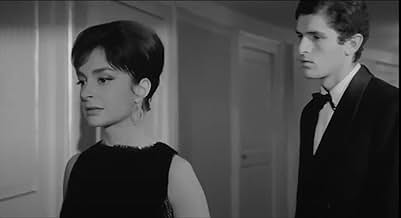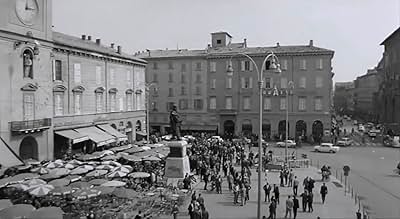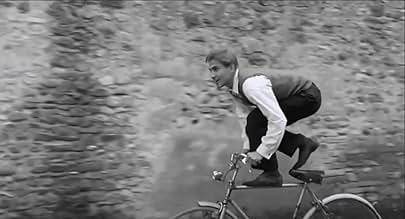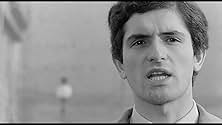VALUTAZIONE IMDb
6,8/10
3300
LA TUA VALUTAZIONE
In seguito alla morte del suo amico, un giovane italiano si avvicina sempre di più alla giovane zia.In seguito alla morte del suo amico, un giovane italiano si avvicina sempre di più alla giovane zia.In seguito alla morte del suo amico, un giovane italiano si avvicina sempre di più alla giovane zia.
- Regia
- Sceneggiatura
- Star
- Premi
- 2 candidature totali
Recensioni in evidenza
BEFORE THE REVOLUTION is a romantic drama film about the maturation of a rebellious young man who, because of his bourgeois origin, lives an easy life. This is the story of torn characters and revolutionary ideals. It is very cold review of the generation gap in Italy.
Fabrizio, a young student in Parma, examines the relations between the middle class and the Communist Party in Italy. He is traumatized by the death of his friend, who has drowned in the River Po. To make matters worse, his beautiful and ten years older aunt Gina from Milan becomes part of his love life. Fabrizio is torn between his weaknesses, aspirations, ambitions and loving care, but a life decision must be made...
Mr. Bertolucci has put a young and beautiful woman at the center of a chaotic love story, which swirls around an immature young man. That young man constantly searches his place in modern civilization flows, and rebels against everything. He comes into contact with an abstract philosophy, art and passionate love. On the other side is an unfortunate young woman, who further complicates the life of an adolescent. She only seeks his understanding and love.
The collapse of a revolution is reflected through the inability of giving and receiving love. A period of a vulnerability, emotional meltdown and alienation comes after that.
An authentic scenery and soundtrack harmoniously fit into this uncertain story.
Francesco Barilli as Fabrizio has offered a good performance of a torn young man who constantly taps in place. Adriana Asti in role of his aunt Gina has picked up my sympathies as a beautiful and unhappy young woman who plays love games with her nephew.
A delicious French food in Italian style.
Fabrizio, a young student in Parma, examines the relations between the middle class and the Communist Party in Italy. He is traumatized by the death of his friend, who has drowned in the River Po. To make matters worse, his beautiful and ten years older aunt Gina from Milan becomes part of his love life. Fabrizio is torn between his weaknesses, aspirations, ambitions and loving care, but a life decision must be made...
Mr. Bertolucci has put a young and beautiful woman at the center of a chaotic love story, which swirls around an immature young man. That young man constantly searches his place in modern civilization flows, and rebels against everything. He comes into contact with an abstract philosophy, art and passionate love. On the other side is an unfortunate young woman, who further complicates the life of an adolescent. She only seeks his understanding and love.
The collapse of a revolution is reflected through the inability of giving and receiving love. A period of a vulnerability, emotional meltdown and alienation comes after that.
An authentic scenery and soundtrack harmoniously fit into this uncertain story.
Francesco Barilli as Fabrizio has offered a good performance of a torn young man who constantly taps in place. Adriana Asti in role of his aunt Gina has picked up my sympathies as a beautiful and unhappy young woman who plays love games with her nephew.
A delicious French food in Italian style.
On occasion while watching Bernardo Bertoulcci's Before the Revolution, which I have done about four times within the past year, I really felt like I was watching someone with a full love of cinema. Not just of how it can distort our perceptions of reality by how close or far or following the subjects are, but that there's a certain purity to it. When a filmmaker has this much bursting out of him at 22, 23 years old, you're bound to find it coming out much like someone that age- still on the brink of life, full of ideas, and still treated in a couple of minor, even unintentional ways, as a kid.
Bertolucci tapped into the vein of the changing of the guard in European cinema with vitality. Like in poetry, the moods and music in the language (or, here, the grammar of film itself) tends to move along with the expressions used to make it so personal you know no one else could have done it this way. Even when it might stumble the film almost seems to pick itself back up, plunging us right into the gut of its subject matter. At times only Last Tango in Paris, Bertolucci's masterpiece, came close with its honesty of what's going on in the world for these people.
And, in truth, the film's structure would not work without some level of honesty to the viewer, or at the least saying with the random, seemingly sometimes mundane set of events 'it's got to be this way, at least for this character.' How much of it is based from Bertolucci's life I'm not certain. But his lead character, Fabrizio (Francesco Barilli, in a splendidly conflicted performance), is not necessarily a great young future leader of men or something. He's a bourgeois -the word is used quite a number of times in the film- and filled with ideals about a Marxist-style revolution, perhaps.
For the most part though he wanders, thinks in quotes, and is close to his Aunt Gina (Adriana Asti, perfect for the part). It is dealing with this relationship that the filmmaker has to find his stride most, and he does. It goes from quiet, to cute, to talkative, to confused, then to something more risqué- passionate. When the character's cross the line, one may want to suddenly find some of what proceeds as taboo. It's not the case.
What turns Before the Revolution into something not as troubling as the subject matter might appear, Bertolucci utilizes a style that corresponds with the scatter-shot frame of mind in the character's story. The plot is 'linear', but there are times where the sort of Italian frame of romanticism comes into play as well. Because the poetry of the emotions helps make this not as potentially pretentious as some of these scenes could come across, it is not without notice that upon once or twice times the subject matter goes into confusing points.
The scenes late in the film involving Puck, for example, become so into the realm of the literary that it goes beyond interesting and into the dangerous realm of the self-indulgent (which is understandable given the filmmaker's talents). Though Italian to the bone, here and there I almost wondered if at times Truffaut and Godard, switching off like hitters in a batting cage, were in the back of Bertolucci's mind as he wrote the script or filmed a scene.
It doesn't hurt at all, of course, that two great musicians contribute to the film. One is Ennio Morricone, who co-wrote the music and performed for the film, and though not mentioned on IMDb, the great Gato Barbieri is also credited in the music. It's not just them but also the whole backbone of the music in the film. It adds that kick that is in many an Italian romance/drama, and also touches of ironic humor, of the joyfulness of youth (i.e. riding the bike early on), and songs used for effectiveness ahead of its time.
By also entrusting much of his own vision into the hands and eyes of Aldo Scavarda, Bertolucci gets cinematography that makes it apparent how with many of his films his style is apparent in every one. That it starts off so rough, yet with delicacy, and combining it with a lot to contemplate in terms of what love is, what politics mean for the well off and the not-so well off, and an uneasy feeling of hopelessness. It's one of the more breathtaking visions to come from a director younger than 25 in the post-Italian new-wave.
It's not too much of a wonder then Scorsese lists this as his primary influence to make Who's That Knocking at my Door. 9.5/10
Bertolucci tapped into the vein of the changing of the guard in European cinema with vitality. Like in poetry, the moods and music in the language (or, here, the grammar of film itself) tends to move along with the expressions used to make it so personal you know no one else could have done it this way. Even when it might stumble the film almost seems to pick itself back up, plunging us right into the gut of its subject matter. At times only Last Tango in Paris, Bertolucci's masterpiece, came close with its honesty of what's going on in the world for these people.
And, in truth, the film's structure would not work without some level of honesty to the viewer, or at the least saying with the random, seemingly sometimes mundane set of events 'it's got to be this way, at least for this character.' How much of it is based from Bertolucci's life I'm not certain. But his lead character, Fabrizio (Francesco Barilli, in a splendidly conflicted performance), is not necessarily a great young future leader of men or something. He's a bourgeois -the word is used quite a number of times in the film- and filled with ideals about a Marxist-style revolution, perhaps.
For the most part though he wanders, thinks in quotes, and is close to his Aunt Gina (Adriana Asti, perfect for the part). It is dealing with this relationship that the filmmaker has to find his stride most, and he does. It goes from quiet, to cute, to talkative, to confused, then to something more risqué- passionate. When the character's cross the line, one may want to suddenly find some of what proceeds as taboo. It's not the case.
What turns Before the Revolution into something not as troubling as the subject matter might appear, Bertolucci utilizes a style that corresponds with the scatter-shot frame of mind in the character's story. The plot is 'linear', but there are times where the sort of Italian frame of romanticism comes into play as well. Because the poetry of the emotions helps make this not as potentially pretentious as some of these scenes could come across, it is not without notice that upon once or twice times the subject matter goes into confusing points.
The scenes late in the film involving Puck, for example, become so into the realm of the literary that it goes beyond interesting and into the dangerous realm of the self-indulgent (which is understandable given the filmmaker's talents). Though Italian to the bone, here and there I almost wondered if at times Truffaut and Godard, switching off like hitters in a batting cage, were in the back of Bertolucci's mind as he wrote the script or filmed a scene.
It doesn't hurt at all, of course, that two great musicians contribute to the film. One is Ennio Morricone, who co-wrote the music and performed for the film, and though not mentioned on IMDb, the great Gato Barbieri is also credited in the music. It's not just them but also the whole backbone of the music in the film. It adds that kick that is in many an Italian romance/drama, and also touches of ironic humor, of the joyfulness of youth (i.e. riding the bike early on), and songs used for effectiveness ahead of its time.
By also entrusting much of his own vision into the hands and eyes of Aldo Scavarda, Bertolucci gets cinematography that makes it apparent how with many of his films his style is apparent in every one. That it starts off so rough, yet with delicacy, and combining it with a lot to contemplate in terms of what love is, what politics mean for the well off and the not-so well off, and an uneasy feeling of hopelessness. It's one of the more breathtaking visions to come from a director younger than 25 in the post-Italian new-wave.
It's not too much of a wonder then Scorsese lists this as his primary influence to make Who's That Knocking at my Door. 9.5/10
After his début, The Grim Reaper (1962), the then 22-year old Bernardo Bertolucci made this, Before the Revolution, an often astonishing homage to the ongoing French New Wave movement and a work of almost unbelievable maturity given his age. Set very much after the revolution, presumably referring to the Italian unification, this is undoubtedly a bleak film, looking back on Italy's history with blind, fond nostalgia, and staring into the abyss of their future. Despite the occasional Marxist monologue, the film is in no ways political, and instead focuses on very human drama, with characters seemingly locked into their social roles and resigned to their fate.
The handsome and idealistic Fabrizio (Francesco Barilli) is destined to marry his childhood sweetheart Clelia (Cristina Pariset), a beautiful woman teetering on aristocracy. After his friend Agostino (Allen Midgette) drowns in a possible suicide, he falls headlong into a potentially dangerous love affair with his aunt Gina (Adriana Asti). Gina is unpredictable, highly emotional and possibly borderline mentally ill, but she is also attractive, seductive and wilful, challenging for the sullen Fabrizio. The death of Agostino clearly damages the passionate Fabrizio, whose studies of Marxism with his teacher and friend Cesare (Morando Morandini) had made him outspoken, but now finds himself blindly wandering into the bourgeoisie.
The film doesn't really have a plot as such, but is instead a collection of scenes and interplays that channel Bertolucci's somewhat pessimistic views of Italy in the 1960's. The characters seem locked in the past, a past that they weren't alive for, and as Fabrizio states, full of nostalgia for the present, as if every passing moment is somehow being snatched away from them. It's best summarised in what is undoubtedly the stand-out scene in the movie, as they visit Puck (Cecrope Barilli), a man crippled with so much debt that he is soon to lose his beloved land. While the camera stays calm and graceful throughout the film, Puck laments as the camera sweeps into their air over rivers and forests, Ennio Morricone's astounding score blaring over the visuals. It's a beautiful moment, full of sad longing that reminded me of Sam the Lion's moving monologue in The Last Picture Show (1971) - one of favourite moments in cinema.
Although this is clearly a wink to Godard and the French New Wave, Bertolucci takes a much more controlled approach to the direction. The camera often glides slowly from side to side, switching character focus as they talk, filmed in crisp black-and-white. It was this approach that caused Godard to voice his displeasure at Bertolucci after viewing his masterpiece The Conformist (1970), claiming it to be too contrived. But cinema can be anything and everything you want it to be, and this makes for beautiful cinema, anchored by a powerful performance by Asti, who makes any possible taboo regarding her incestuous relationship with her nephew become redundant. This is much more than a simple love story, this is a film about a country, it's past and present.
www.the-wrath-of-blog.blogspot.com
The handsome and idealistic Fabrizio (Francesco Barilli) is destined to marry his childhood sweetheart Clelia (Cristina Pariset), a beautiful woman teetering on aristocracy. After his friend Agostino (Allen Midgette) drowns in a possible suicide, he falls headlong into a potentially dangerous love affair with his aunt Gina (Adriana Asti). Gina is unpredictable, highly emotional and possibly borderline mentally ill, but she is also attractive, seductive and wilful, challenging for the sullen Fabrizio. The death of Agostino clearly damages the passionate Fabrizio, whose studies of Marxism with his teacher and friend Cesare (Morando Morandini) had made him outspoken, but now finds himself blindly wandering into the bourgeoisie.
The film doesn't really have a plot as such, but is instead a collection of scenes and interplays that channel Bertolucci's somewhat pessimistic views of Italy in the 1960's. The characters seem locked in the past, a past that they weren't alive for, and as Fabrizio states, full of nostalgia for the present, as if every passing moment is somehow being snatched away from them. It's best summarised in what is undoubtedly the stand-out scene in the movie, as they visit Puck (Cecrope Barilli), a man crippled with so much debt that he is soon to lose his beloved land. While the camera stays calm and graceful throughout the film, Puck laments as the camera sweeps into their air over rivers and forests, Ennio Morricone's astounding score blaring over the visuals. It's a beautiful moment, full of sad longing that reminded me of Sam the Lion's moving monologue in The Last Picture Show (1971) - one of favourite moments in cinema.
Although this is clearly a wink to Godard and the French New Wave, Bertolucci takes a much more controlled approach to the direction. The camera often glides slowly from side to side, switching character focus as they talk, filmed in crisp black-and-white. It was this approach that caused Godard to voice his displeasure at Bertolucci after viewing his masterpiece The Conformist (1970), claiming it to be too contrived. But cinema can be anything and everything you want it to be, and this makes for beautiful cinema, anchored by a powerful performance by Asti, who makes any possible taboo regarding her incestuous relationship with her nephew become redundant. This is much more than a simple love story, this is a film about a country, it's past and present.
www.the-wrath-of-blog.blogspot.com
No question about it that this is a well made film but is it also an interesting one? Not really in my opinion. It doesn't really tell a story and it's hard to say really what point the movie tried to make, if any.
It's more a movie that focuses on its themes, rather than telling a story. It does make this movie confusing to follow at times, since you have no idea what the movie is trying to do or say at times but overall the movie remains still a fascinating one. It's an absorbing movie really, that is well made and put together by its, at the time, 22-year old director Bernardo Bertolucci.
Directing-wise this movie is quite an accomplishment, especially when you're also taking into consideration that this was only Bernardo Bertolucci's second movie. The characters, the actors and some of the sequences are directed really well. Even when you don't understand or like this movie, you'll surely still notice this.
Guess you could interstate this movie in different ways. You could take it as a coming of age movie, as well as a reverse coming of age movie, in which one characters wants progress and change, while the other doesn't want anything to change and actually rather go back in time. Change is really the keyword for this movie. It's filled with references to changes, while new times get welcomed and old times slowly become a thing of the past.
But having said all this, the story still doesn't really make a lasting impression with anything. No real questions are asked in it, since the movie is more often too busy providing answers to things that never really got questioned in the first place. Some more focus and development of the main plot line and its characters wouldn't had harmed the movie.
Not an interesting movie to watch but it can still be a fascinating one at times, as weird as this might sound.
7/10
http://bobafett1138.blogspot.com/
It's more a movie that focuses on its themes, rather than telling a story. It does make this movie confusing to follow at times, since you have no idea what the movie is trying to do or say at times but overall the movie remains still a fascinating one. It's an absorbing movie really, that is well made and put together by its, at the time, 22-year old director Bernardo Bertolucci.
Directing-wise this movie is quite an accomplishment, especially when you're also taking into consideration that this was only Bernardo Bertolucci's second movie. The characters, the actors and some of the sequences are directed really well. Even when you don't understand or like this movie, you'll surely still notice this.
Guess you could interstate this movie in different ways. You could take it as a coming of age movie, as well as a reverse coming of age movie, in which one characters wants progress and change, while the other doesn't want anything to change and actually rather go back in time. Change is really the keyword for this movie. It's filled with references to changes, while new times get welcomed and old times slowly become a thing of the past.
But having said all this, the story still doesn't really make a lasting impression with anything. No real questions are asked in it, since the movie is more often too busy providing answers to things that never really got questioned in the first place. Some more focus and development of the main plot line and its characters wouldn't had harmed the movie.
Not an interesting movie to watch but it can still be a fascinating one at times, as weird as this might sound.
7/10
http://bobafett1138.blogspot.com/
It's strange to think that Bertolucci was only 23 when he did this film, but then it makes perfect sense cause the story loosely centers around a young man approaching adulthood. It's even stranger to realize that only 8 years later he directed 'The Last Tango in Paris' where his protagonist already experiences his midlife crises. Back in 1964 Bertolucci's main interest was not story telling but rather to find a new visual language to portray his generation. Heavily influenced by the Nouvelle Vague, Godard in particular, that he even mentions at some length here, Bertolucci is eager to break with as many (cinematographic) conventions as possible, but the imagery he develops in the process is so beautiful that this is a delight to watch from beginning to end. Also it serves as a reminder that there was actually a time when there seemed to be an alternative to capitalism, though the revolution is only talked about. The whole thing works like a kaleidoscope or mosaic of the time. At first I had trouble to follow the plot because scenes don't necessarily respond to each other in a cause and effect kinda way but once I realized that an ongoing story is not what this is about I was able to relax and enjoy the scenery even more. And though our heroes suffer from first signs of disillusion, back then everything seemed possible, whether it was changing our society or changing the aesthetics of cinema. What interesting times.
Lo sapevi?
- QuizBernardo Bertolucci was only 22 when he made this film.
- ConnessioniFeatured in Nathalie... (2003)
I più visti
Accedi per valutare e creare un elenco di titoli salvati per ottenere consigli personalizzati
- How long is Before the Revolution?Powered by Alexa
Dettagli
Botteghino
- Lordo in tutto il mondo
- 9815 USD
- Tempo di esecuzione
- 1h 55min(115 min)
- Colore
- Mix di suoni
- Proporzioni
- 1.85 : 1
Contribuisci a questa pagina
Suggerisci una modifica o aggiungi i contenuti mancanti

![Guarda Trailer [OV]](https://m.media-amazon.com/images/M/MV5BNWRiN2E3YjYtNmI2MC00ZjdmLWE2N2EtYWFjYTNjZTRmZTZiXkEyXkFqcGdeQXRodW1ibmFpbC1pbml0aWFsaXplcg@@._V1_QL75_UX500_CR0)
